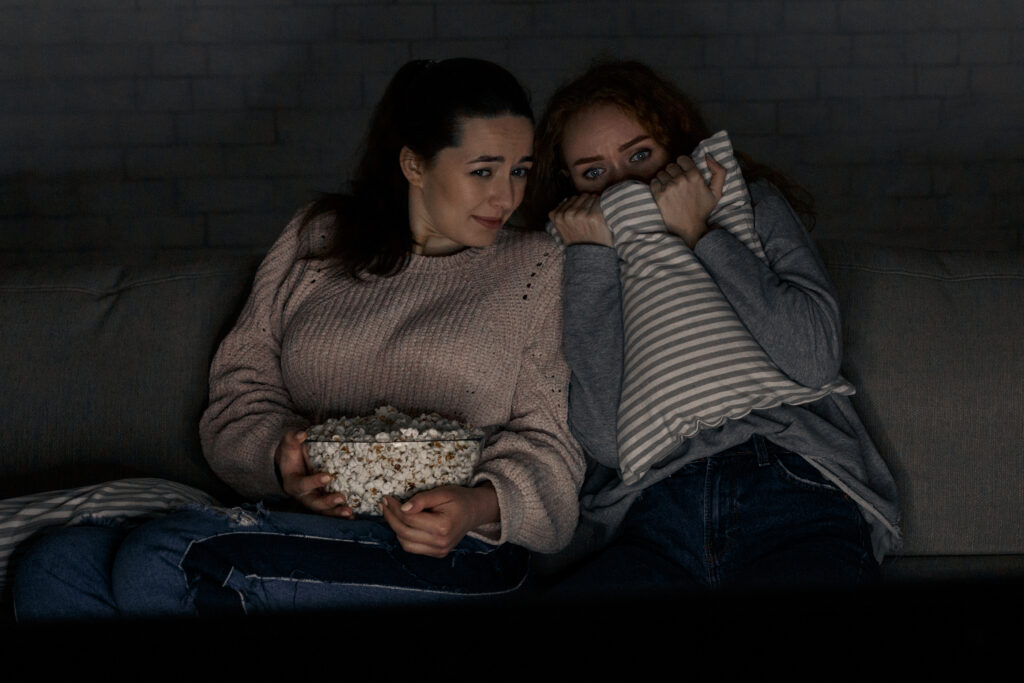
My best friend and I are kindred spirits in more ways than one – connected by a love of Christmas, cats, ‘80s music, and wine. But what separates us entirely is a love of horror movies. While she takes comfort in 90 minutes of peril, I find myself buried in cushions at the mere indication of threat.
This begs the question, what attracts some people to the horror genre and, relatedly, what terrifies the subset of the population who cannot tolerate it? King of horror Stephen King reckons “we’re all mentally ill.” I’d like to think it’s more nuanced than that; that certain characteristics make us perhaps more equipped to deal with horror — even if it’s fictional.
The role of empathy
If I dig deeper than the bucket load of pigs’ blood or the nail-biting tension, what is it that I can’t stand about a scary movie? I can accept the unpredictability, even the potential loss of life, but what ultimately fills me with dread is watching someone endure pain.
This seems to me a fairly rational response – one of empathy. This ties in with evidence that those with lower levels of empathy tend to enjoy fright and violence more, but it’s certainly not an exhaustive indicator. I look to my best friend, who might cry at seeing someone old eating alone, and I’m not convinced.
Cynthia Vinney, an expert in media psychology, points out that “people with empathy can enjoy horror movies, just for different reasons.” This is likely to involve empathizing with the protagonist and triumphing when the good guy wins. Where my friend and I might differ is in how this empathy impacts us, with my feelings lingering once the movie is over.
RELATED: Watch These 7 Not-So-Scary Movies to Get Into The Halloween Spirit
Horror movies attract thrill seekers
Another proven commonality between horror movie buffs is a thrill-seeking tendency as Vinney cites, “people who are high in sensation-seeking tend to experience positive emotions when they have intensely stimulating experiences, even if those experiences are negative.” There is certainly some weight in this when I consider myself versus my bestie. If there is such a thing as a thrill-seeker, I am the opposite. I was always glad to be too short to ride the rollercoasters, and the thought of sky-diving leaves me with a dry mouth.
This quest for adrenaline within the safe confinements of a movie appeals to my best friend, for example, as she says she experiences high levels of the hormone during a scary movie (including heart palpitations) and it all becomes part of the enjoyment. Whereas our ancient ancestors’ fight-or-flight response might have been activated by the genuine threat of a predator, she adds the important caveat — “Scary movies aren’t real.”
The importance of fiction
Where I might question, “Isn’t the real world scary enough?” and decline the invitation of any further negativity, my friend sees it differently. She views a scary movie as a distraction from the atrocities of the world. Vinney echoes this: “While all the real news may get you down, going to a scary movie actually gives you 90 minutes of escape.”
The fictional nature of horror provides viewers with a sense of control by placing psychological distance between them and the violence. In a very real way, Vinney proffers, “it gives people fears to face even if they don’t have specific fears in mind,” allowing us to exercise strength and resilience.
Author Walter Ellis says that by indulging in fictional violence, we can “both study and de-fang our monsters,” taking away the power they hold over us. “For some people,” Vinney goes on to say, “being able to vicariously experience things like a knife-wielding attacker or an alien invasion are a safe way to rehearse what they would do if they encountered a real-life threat.” This theory holds up as a recent study evidenced that horror fans were better able to cope with the pandemic.
Anxiety and horror: cause or cure?
The link between anxiety and scary movies is paramount in all of this. While, for me it is likely to induce unpleasant physical sensations and unwanted negativity, “for some”, Vinney tells us “horror might be a safe way to relieve anxiety.” For instance, my best friend uses it tactically on a Sunday evening to distract herself from the fear of the dreaded Monday. Once you escape into the narrative of a scary movie, the source of your anxiety changes. “While someone with anxiety might focus on the past or the future,” says Vinney “a scary movie lets people focus all their attention on the present”.
I don’t think we’ll ever have a definitive answer as to why some of us like horror and some don’t. As Vinney, a fellow safety seeker, tells me, I’m “just not built for horror. Just like there are many reasons for enjoying horror, there are many reasons for not enjoying horror. If you tend to ruminate; have a tendency to overthink; or you’re simply less sensation-seeking.” I encompass all of these traits.
Self-preservation is key in all of this – if watching a scary movie allows you to release tension and feel alive, then indulge your inner King. If, like me, it causes unnecessary stress and rumination, then my recommendation would be to stick to “Hocus Pocus” this Halloween. Facing your fears is overrated.